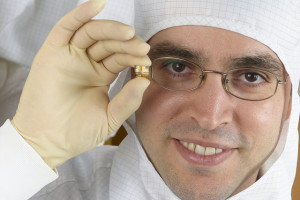Israel’s ‘electronic nose’ pioneer shows how nanotechnology can improve and simplify diagnosis of an often deadly cancer

A potentially quick, simple, inexpensive and non-invasive method for identifying people at risk of stomach (gastric) cancer and finding tumors at an earlier stage has been announced by Prof. Hossam Haick at the Technion-Israel Institute of Technology. Haick, a professor of chemical engineering at the Technion’s Russell Berrie Nanotechnology Institute, developed the nanotech breath-analysis system Na-Nose to detect a range of illnesses. The latest study proved its effectiveness in predicting and diagnosing gastric cancer.
Writing in the prestigious journal Gut, Haick and his lab team describe how they took 968 breath samples from 484 patients, including 99 known to have gastric cancer.
They analyzed each sample twice – once using a standard gas chromatography-mass spectrometry method (GCMS) and again with Haick’s nanoarray technology combined with a pattern-recognition algorithm — for Helicobacter pylori, a bacterium known to increase the risk for stomach cancer. The tests showed that patients with cancer as well as those at high risk had distinctive “breath prints.”
The tests showed that patients with cancer as well as those at high risk had distinctive “breath prints.
The nanoarray analysis allowed the researchers to distinguish between patients with gastric cancer, people with precancerous stomach lesions, and healthy individuals, based on the concentrations of eight specific substances (out of 130) in the oral cavity. The method had 73 percent sensitivity, 98% specificity and 92% accuracy. The diagnosis is accurate regardless of other factors such as age, sex, smoking habits, alcohol consumption and the use of anti-oxidant drugs.
Catching cancer early
This innovative stomach cancer-detection technology has significant advantages over the existing detection methods that are more invasive and less capable of finding tumors in the earliest stages, according to Gut.
This article has been republished with permission by www.ISRAEL21c.org. Click here to continue reading.




